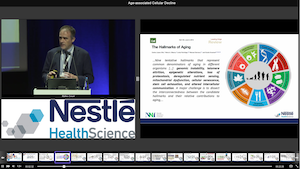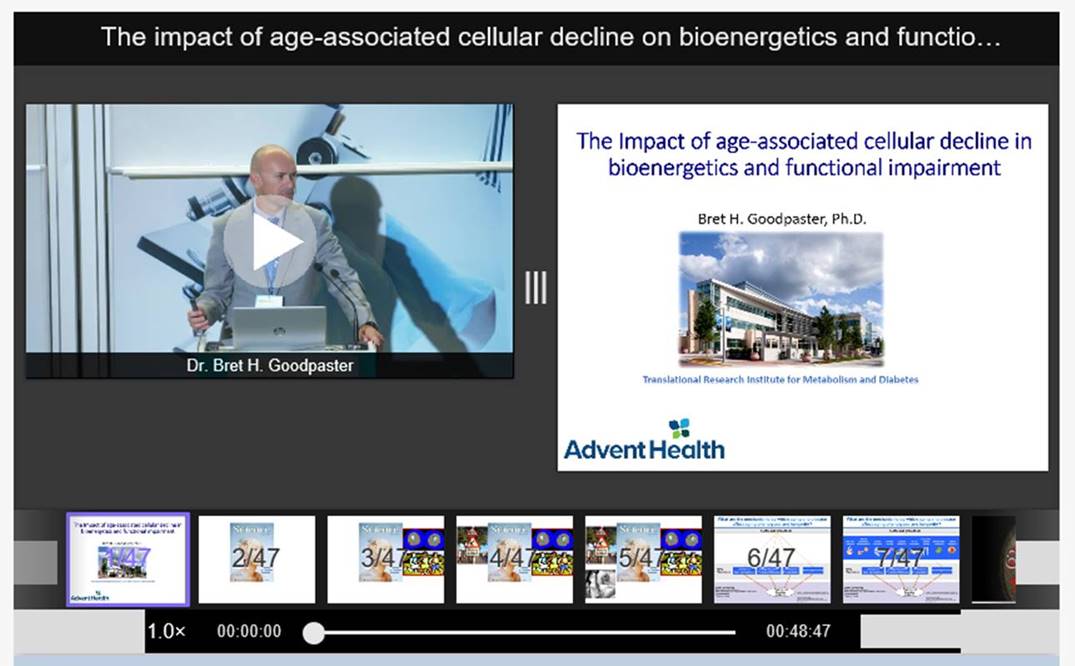Advancing the Therapeutic Role of Nutrition
A series of videos captures insights into how the therapeutic role of nutrition is advancing today, for tomorrow and together through the collaboration between healthcare professionals, patients, breakthrough biotech leaders and Nestlé Health Science.
The quest for innovation is strong across fields as diverse as gastrointestinal sensitivities, oncology, infant food allergy to new technology platforms such as the microbiome and amino acids; it is an innovation frontier expanding the boundaries of nutrition, health and wellness.
Disclaimer and Advisory note to viewers: These series of films provide insights into the advancing role of nutrition in health management and science and are not intended to promote any particular product. They are not a recommendation for use, nor are they designed to instruct on their use or application. All specialized nutrition should only be considered upon the recommendation or prescription of relevant healthcare professionals and be taken under their supervision.
Below is a list of the videos in the above carousel. This allows you to go straight the videos that are of most interest
Advancing the Therapeutic Role of Nutrition
Capture insights into how the therapeutic role of nutrition is advancing today, for tomorrow and together through the collaboration between healthcare professionals, patients, breakthrough biotech leaders and Nestlé Health Science.
The quest for innovation is strong across fields as diverse as gastrointestinal sensitivities, oncology, infant food allergy to new technology platforms such as the microbiome and amino acids; it is an innovation frontier expanding the boundaries of nutrition, health and wellness.
Duration: 3.16 minsSharing Solutions for Gastrointestinal Sensitivities
Gastrointestinal sensitivities – including Irritable Bowel Syndrome (IBS) – are a major personal and health economic burden. Managing IBS can cost up to 20bn dollars in the USA alone.1
Learn how Nestlé Health Science is helping advance the adoption of a pioneering dietary approach – developed by experts at Monash University, Australia – that limits dietary sugars associated with IBS symptoms.
1 Reference: https://www.ncbi.nlm.nih.gov/pubmed/15298528
Duration: 2.58 minsInspired by a Shared Goal: Seizure Control
Pediatric epilepsy impacts not just the child, but also the wider family. A significant proportion of patients don't respond to mainline drugs but experts are advancing understanding and adoption of ketogenic dietary therapy. It switches patient’s metabolism to burning fat rather than carbohydrates as a source of energy.
Innovative products such as those developed by Vitaflo, have a key role as part of a wider educational effort to enable parents and carers to make a palatable diet that patients can adhere to. Seizure control is transforming lives.
Duration: 3.55 minsMastering the Microbiome
The ability to analyze microorganisms is today unraveling the mysterious of the microbiome – the 100 trillion microorganisms that live within us. An unhealthy or so-called dysbiotic microbiome is now understood to be an underlying cause of a range of health conditions.
The ability to analyze microorganisms is today unraveling the mysterious of the microbiome – the 100 trillion microorganisms that live within us. An unhealthy or so-called dysbiotic microbiome is now understood to be an underlying cause of a range of health conditions.
Duration: 4.02 minsFast Forwarding Therapies: From the Food Proteome
Amino acids have long been recognized as the building blocks of protein, but today breakthroughs are being made revealing that amino acid imbalance may have be causal factor in a multitude of disease states.
Nestlé Health Science partner Axcella Health is exploring the human diet to identify proteins that have the amino acid signature capable of restoring cellular balance and thereby treating the underlying cause of the disease. It’s a new therapeutic modality in the making.
Duration: 3.29 minsShortening the Journey: in diagnosing Cow’s Milk Protein Allergy
Cow’s Milk Protein Allergy is the most common infant food allergy in the first year of life; yet it’s range of non-specific symptoms make it difficult to recognize, leading to delays in therapeutic intervention.
Experts, supported by Nestlé Health Science, are however introducing a simple to use scoring tool – the Cow’s Milk Related Symptom Score – enabling primary healthcare professionals to interpret symptoms and consider earlier intervention. An innovative skin patch diagnostic tool is also in development in this dynamic field of therapeutic advance.
Duration: 3.14 minsFirst "CDED Expert" training day
CWhat do leading IBD experts say about the Crohn's Disease Exclusion Diet (CDED)? Learn more from the experts behind the diet and the clinical trials in the video from the first "CDED Expert" training day that took place in Copenhagen, March 2019.
Duration: 6.37 minsRole of Mitochondrial Dysfunction in Age Associated Cellular Decline (AACD)
Often with aging, many adults experience exhaustion, fatigue, muscle weakness, and physical impairment. Because mitochondria are the “power plant” responsible for energy production and metabolism in our cells, organs, and entire body, mitochondrial dysfunction may be at the basis of these symptoms and the loss of functionality that is common with age.
Join Dr. Matteo Cesari, MD PhD, to understand the role that mitochondrial dysfunction plays in age-related conditions and how acting on the mechanisms of cellular aging may help how we manage our health.
Duration: 12.25 minsAge Associated Cellular Decline (AACD) – Mechanisms and Perspectives Relevant to Undernutrition, Sarcopenia and Frailty in Older Adults
Every day in clinical practice, doctors care for patients with age-related conditions at risk for loss of functionality. Intervening on the biological mechanisms of aging—including mitochondrial dysfunction—is a promising solution for the management and prevention of age-related conditions that can address patients’ needs, their quality of life and functionality.
Join Dr. Matteo Cesari, MD PhD, to understand several hallmarks of aging and how acting on cellular mechanisms, such as mitochondrial dysfunction, has potential to address the symptoms and needs of aging adults.
Duration: 22.26 minsThe Impact of Age Associated Cellular Decline on Bioenergetics and Functional Impairment
People age differently and there are different patterns of healthy vs. unhealthy aging. Notably, quite a bit of data suggest that lifestyle habits—such as regular exercise and physical activity—promote better mitochondrial function and energy metabolism in older adults. In comparison, inactivity or disuse are detrimental to muscle functionality and Age Associated Cellular Decline due to mitochondrial dysfunction.
Join Dr. Bret Goodpaster, PhD, to understand the importance of mitochondrial function on healthy aging, the impact of mitochondrial dysfunction on unhealthy aging, and how lifestyle habits (physical activity and nutrition) may improve energy metabolism—the efficiency of mitochondrial energy metabolism.
Duration: 48 minsThe Importance of Mitochondrial Dysfunction with Aging and Effects of Nutrition and Lifestyle on Energy Metabolism
The body has trillions of mitochondria that tend to dysfunction with older age. As mitochondria serve to convert nutrients into energy to power physical function, it’s important to better prevent age-related declines in mitochondrial function. Cellular nutrition that targets mitochondrial energy metabolism has the potential to impact some of the negative effects of aging.
Join Dr. Bret Goodpaster, PhD, to understand the importance of mitochondrial function on healthy aging, emerging indicators of mitochondrial dysfunction in older adults, and how lifestyle habits (physical activity and nutrition) may improve energy metabolism which is important for how we move and function daily.
Duration: 9 minsA short interview with Prof Pedro Abizanda, MD, PhD. Undernutrition, Sarcopenia and Frailty. Is there a Link?
Duration: 12 minutesA short interview with Prof Philipp Schuetz, MD, PhD. Oral Nutritional Support in Medical Inpatients - Is it Worth the Effort?
Duration: 4 minutesHow GlyNAC can protect cells from oxidative stress
As you get older, you may find you are less resilient than you used to be and you don’t feel you bounce back as quickly as you once did. This is one of the signs of Age-Associated Cellular Decline, or AACD. Listen to two of our experts, Dr. Matteo Cesari and Dr. Jose Vina, discuss more on AACD and how GlyNAC, a key cellular nutrient, protect cells from oxidative stress.


